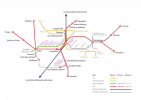Why the Integrated Rail Plan claims are dubious at best
14 DEC, 2021 BY
WILLIAM BARTER
No doubt the Integrated Rail Plan will please some people. Birmingham – Nottingham and London – Nottingham high speed services are new, and the journey times impressive. However, Peter in Leeds has clearly been robbed to pay Paul in Nottingham. For an allegedly Integrated Rail Plan to take services between London and the biggest financial centre outside London, and just say “we’ll have a think about this later”, is farcical, and only puts off the inevitable as there is no easy answer. Improved journey times by way of an “upgraded” East Coast Main Line to Leeds compare poorly with HS2’s saving of 38 minutes against the best current timing, and 55 minutes against typical times.
William Barter is an independent rail consultant
Even so, the IRP claims are dubious at best - saving 20 minutes on journeys on the ECML is pure fantasy. It takes only a moment in Excel to derive a rule of thumb that, compared with running at 125mph, 140mph saves a minute every 20 miles. So even if trains already ran flat out all the way to Leeds, less than 10 minutes could be gained, and where the ECML does not permit 125mph now, the reasons are very solid, the solutions very expensive. So in practice the saving is hardly likely to be half that, while “easing pinchpoints” will not conceivably contribute the other 15 minutes. All the likely works were rejected by the SRA over 20 years ago (when Virgin bid for the East Coast franchise by proposing a – guess what – new high speed line to avoid them) as too difficult, expensive and disruptive.
The IRP seems oblivious to the capacity sink-hole of mixing fast and slow trains on the same tracks, instead focusing on headline journey times, something for which it criticises HS2. One train per day from Newcastle to London reaches Kings Cross in 156 minutes non stop, but even if getting that down to Shapps’ 145 minutes is enough of a stretch, such a train, unless it is to devastate slower services, could not be pathed as anything other than a once-a-day flyer. The suggested time of 148 minutes for a ‘stopping’ service from Newcastle, being only 3 minutes slower than the claimed non-stop time, allows for only one stop, whereas today’s trains make up to seven intermediate calls – what is to happen to those?
HS2’s time by comparison would be offered twice an hour, every hour of the day, capturing the end-to-end business whilst in their absence South of York, replacement services could actually increase the service levels at intermediate stations – quite the reverse of the IRP’s assertion that these intermediate stations would suffer, which seems to me to be devoid of logic. Given how shamefully dilatory the DfT has been over released capacity services after Phase 1/2A of HS2, it is difficult to see that any analysis exists to support this contention.
The HS2 route to London also offers opportunities that the ECML does not, such as the call at Birmingham Interchange to serve the area South of Birmingham, and at Old Oak Common for the Thames Valley and Heathrow. However fast the ECML might be to London, it does not provide these opportunities at all.
For Sheffield, HS2’s time from Euston would be 86 minutes, with stops at East Midlands Hub (including extra time to detach a portion for Leeds or York) and Chesterfield. The IRP states that this time can be matched with upgraded classic lines from East Midlands Parkway. But taking known HS2 times, a little new modelling, and the best current times on the classic network calling at East Midlands Parkway, Derby and Chesterfield, the time would be 94 minutes – is it credible that any ‘upgrade’ could knock eight more minutes off the run from East Midlands to Sheffield? Chris Grayling cancelled Midland Main Line electrification on the basis that it would only save 1 minute compared with bi-modes. The journey times quoted to Nottingham and Sheffield rely on more heroic assumptions as to the potential of ‘upgrades’ (a word flashed around as if upgrading a railway meant just downloading a bit of software), even without asking if they should call at Birmingham Interchange (which they should).
One big opportunity of the Eastern leg has gone unmentioned. Journey opportunities by train between the South Midlands and Yorkshire and the North East are poor now, mostly involving driving much of the way, and even so are uncompetitive with car overall. Meanwhile the M1 and M18 are packed. Both Birmingham Interchange and East Midlands Hub would have provided railheads fed by local services for fast trains to Leeds and York, but the IRP offers no such equivalent.
There is no indication of a service specification in the IRP, but if, over the distances involved, you can’t run half hourly to Nottingham from each of Birmingham and London, then it’s not worth running at all. That means that the Nottingham trains have to be assumed to replace the Leeds services at Curzon Street, whilst at Euston the Nottingham and Sheffield trains, on top of the 11 trains per hour of the Birmingham and NW leg services, bring the total to 15tph. That’s within the 16 trains per hour capability of the 10 platform station, but implies that only one more train could be added, whereas in the HS2 plans Leeds would have had three trains per hour and Newcastle, two. So whatever the outcome of the £100M think-piece about Leeds, Paul has not just robbed Peter, but stands in the way of making up his losses in the future.
Some commentators have in the past decried HS2 as a “grand projet”. This country is not littered with grand projets that we wish we hadn’t built. It is, however, infested with descoped projects that have had to be expensively reworked within a few years of completion. The IRP is set fair to exacerbate that infestation.



